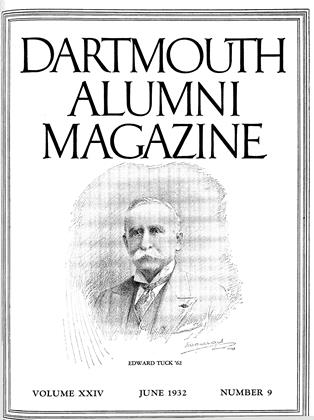_ Stanwood Cobb '03. The John Day Cos., New York. 1932. pp. 287.
Are you trying to analyze yourself? Are you interested in finding out what you can do to make your life more interesting, more serviceable, and a happier one? Then let Stanwood Cobb inspire you with his enthusiastic account of what a person may help himself to achieve in the way of discovering his own bit of genius. You may not have the capability of Cobb's recurring illustration, Noguchi, the bacterioligist, but you have something which may be merely awaiting development. You may have found it, but have you?
All people wonder about themselves some time or other. It is then that they often need a counselor. Some do not realize this, others do, but find no one with whom to counsel. In Cobb you will find a friend. The reader of "Discovering the Genius within You" will not find it dry or boring, pedantic or moralizing, but straightforward, frank, and sincere. Cobb's style is highly readable. Short concise sentences convey his ideas with little flourish or involvement. If he repeats himself at times, one will not notice it, but will read with interest to the last page.
Others have written about the same subject in the so-called "popular" works. Baudoin's "The Power within You" and Dimnet's "The Art of Thinking" give us analysis for itself from a narrower viewpoint. Pitkin's "The Psychology of Achievement" gives us an understanding of the psychological basis upon which success is built. But they have all failed to combine analysis, understanding, and inspiration. One will not find the clean cut analysis of Baudoin and Dimnet, nor the detailed psychological principles of Pitkin, but one will find enough of both to give a basis upon which inspiration may be built, for certainly, inspiration hanging in mid-air by itself is impotent.
Further, the reader is doomed to disappointment if he expects in any way a scholarly book from the title or the topic with which Cobb deals. There are such books on the subject of genius. One will need to seek them if he has only the attitude of the scholar, and fortunately so, because if all individuals wrote from a detailed and argumentative viewpoint, what a dull and stilted world we would have. We would be doing the very thing which Cobb says we should avoid, namely, we would be killing the interests of a tremendous number of individuals.
To add further to the charm of Cobb's book, he brings to it a wealth of personal experience. Since his style is fluent, you feel that you are sharing both his ideas and his experiences.
Yet, Cobb's style is energetic, which in itself will keep you alert. One may read of the "Universality of Genius," about "Concentration" and "The Power of Enthusiasm," that "Genius is Childlike," or of the metaphorical "Bovine Souls," "The Midas Touch" or "Lotus Island," to mention but a few of the chapter headings. Each will leave its stimulating impression upon the reader.
When the reader has finished, he may feel either satisfied with his lot, because he has lived as Cobb suggests, or dissatisfied because he has missed the point of life completely. But then, is it too late to begin over again? Cobb says not. One can never tell until he tries. Just reading a book will never develop one's genius, nor give one success. The most it can do is to awaken one to his potentialities, to inspire one, and to guide one. One will need to keep his own measurements before him, as children keep their daily records before them in school as an aid in showing them where they can improve. It is a complex task. When one finishes Cobb's book, he may want to gain more insight into himself. If he does. Cobh has achieved his purpose.
 View Full Issue
View Full Issue
More From This Issue
-
 Article
ArticleEdward Tuck: A Biographical Sketch
June 1932 By Horatio S. Krans -
 Article
ArticleDartmouth's Greatest Benefactor
June 1932 By Russell R. Larmon -
 Class Notes
Class NotesCLASS OF 1910
June 1932 By Harold P. Hinman -
 Class Notes
Class NotesCLASS OF 1926
June 1932 By J. Branton Wallace -
 Sports
SportsIron Man
June 1932 -
 Class Notes
Class NotesCLASS OF 1905
June 1932 By Arthur E. McClary
Books
-
 Books
BooksThe American Ski Annual
February 1936 -
 Books
BooksRedeeming Features
September 1976 By DAVID M. SHRIBMAN'76 -
 Books
BooksClose Encounters
DECEMBER 1984 By Frances T. Nye, M.D -
 Books
BooksLove Story
June 1975 By JACK DE GANGE -
 Books
BooksTHE HISTORY OF ROME.
JUNE 1959 By NORMAN A. DOENGES -
 Books
BooksHILL WIND
March 1936 By R. B. Chamberlin

